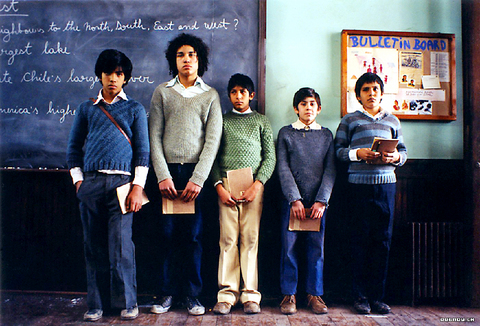Children see more than they understand, and understand more than they know. Their intense, limited way of perceiving the world, sometimes sentimentally rendered as moral
innocence, is one of the reasons they are frequently placed at the center of movies about war, revolution and other forms of social upheaval and political disaster. Gonzalo (Matias Quer), the 11-year-old boy at the center of Andres Wood's Machuca, is warily edging toward adolescence, preoccupied with the petty brutality of the schoolyard and the unspoken miseries of his upper-middle class Santiago household.
But because his coming of age takes place in Chile in 1973, his ordinary hardships, joys and rites of passage are charged with inordinate tension. The audience, aware from the start that the military coup against Salvador Allende's government lurks on the horizon, feels their sympathy for this child -- and their more general nostalgia for childhood -- shadowed by anxiety and dread.

PHOTO COURTESY OF FOX MOVIES
For the most part Wood, who based the film on events from his own early life, confines the story to Gonzalo's perspective. Intimations of Chile's volatile political situation pop up almost casually, via the television set, graffiti in the street and overheard adult conversations. But there is no question that Gonzalo's private world, like his country, is in a state of ferment. A soft-faced, passive boy, he is forced to accompany his mother (Aline Kuppenheim) on visits to her lover, an older, wealthy sensualist who buys the boy's complicity with handsome bound editions of Lone Ranger comics. At home, Gonzalo has to deal with his weak-willed father and his sister's loutish boyfriend. At the private English-language boys' school Gonzalo attends, the headmaster (Ernesto Malbran), a priest flush with the experimental, egalitarian spirit of the Allende government, has
sgranted scholarships to a few boys from the nearby slums.
One of them, Pedro Machuca (Ariel Mateluna), becomes Gonzalo's friend, and introduces him to another side of life in Santiago. Pedro also introduces Gonzalo to Silvana (Manuela Martelli), a tough, fearless shantytown girl who becomes their frequent companion, and the crux of a sweet romantic triangle that makes parts of Machuca resemble a juvenile Jules and Jim. The three friends help Silvana's father take advantage of the political situation by selling flags at competing demonstrations, and play kissing games on the banks of a muddy creek.
Machuca is both sweet and stringent, attuned to the wonders of childhood as well as its cruelty and terror. Wood allows the story to unfold at a leisurely, almost dawdling pace, which matches the consciousness of his young protagonist. Wood ends Gonzalo's youthful idyll with a few short, painful strokes -- scenes of the military takeover that capture the harsh, emphatic force with which authoritarian rule announces its arrival.

President William Lai (賴清德) yesterday delivered an address marking the first anniversary of his presidency. In the speech, Lai affirmed Taiwan’s global role in technology, trade and security. He announced economic and national security initiatives, and emphasized democratic values and cross-party cooperation. The following is the full text of his speech: Yesterday, outside of Beida Elementary School in New Taipei City’s Sanxia District (三峽), there was a major traffic accident that, sadly, claimed several lives and resulted in multiple injuries. The Executive Yuan immediately formed a task force, and last night I personally visited the victims in hospital. Central government agencies and the

Australia’s ABC last week published a piece on the recall campaign. The article emphasized the divisions in Taiwanese society and blamed the recall for worsening them. It quotes a supporter of the Taiwan People’s Party (TPP) as saying “I’m 43 years old, born and raised here, and I’ve never seen the country this divided in my entire life.” Apparently, as an adult, she slept through the post-election violence in 2000 and 2004 by the Chinese Nationalist Party (KMT), the veiled coup threats by the military when Chen Shui-bian (陳水扁) became president, the 2006 Red Shirt protests against him ginned up by

As with most of northern Thailand’s Chinese Nationalist Party (KMT) settlements, the village of Arunothai was only given a Thai name once the Thai government began in the 1970s to assert control over the border region and initiate a decades-long process of political integration. The village’s original name, bestowed by its Yunnanese founders when they first settled the valley in the late 1960s, was a Chinese name, Dagudi (大谷地), which literally translates as “a place for threshing rice.” At that time, these village founders did not know how permanent their settlement would be. Most of Arunothai’s first generation were soldiers

Among Thailand’s Chinese Nationalist Party (KMT) villages, a certain rivalry exists between Arunothai, the largest of these villages, and Mae Salong, which is currently the most prosperous. Historically, the rivalry stems from a split in KMT military factions in the early 1960s, which divided command and opium territories after Chiang Kai-shek (蔣介石) cut off open support in 1961 due to international pressure (see part two, “The KMT opium lords of the Golden Triangle,” on May 20). But today this rivalry manifests as a different kind of split, with Arunothai leading a pro-China faction and Mae Salong staunchly aligned to Taiwan.